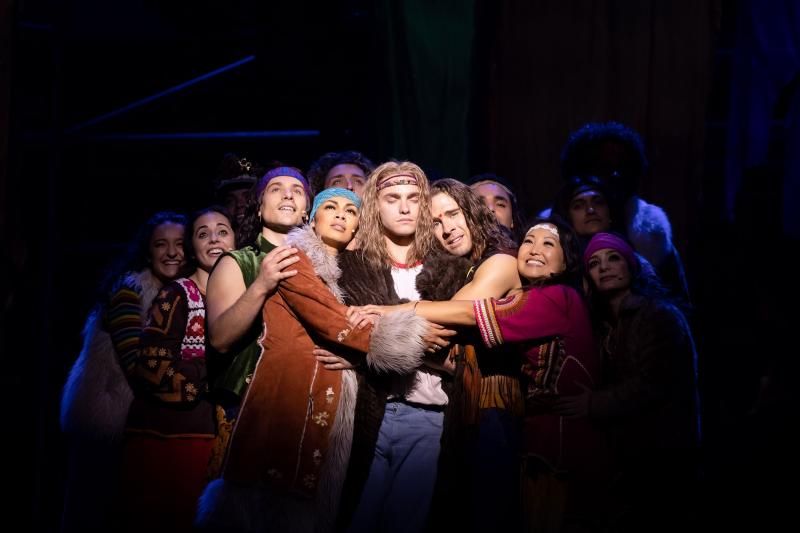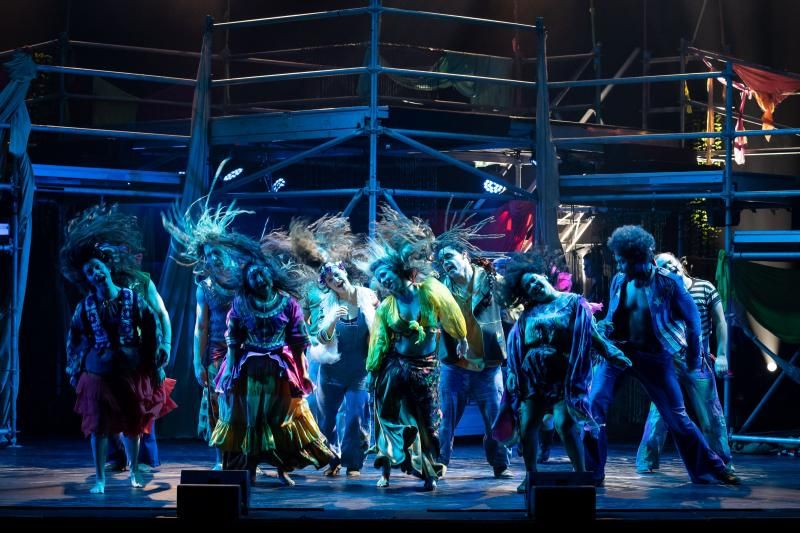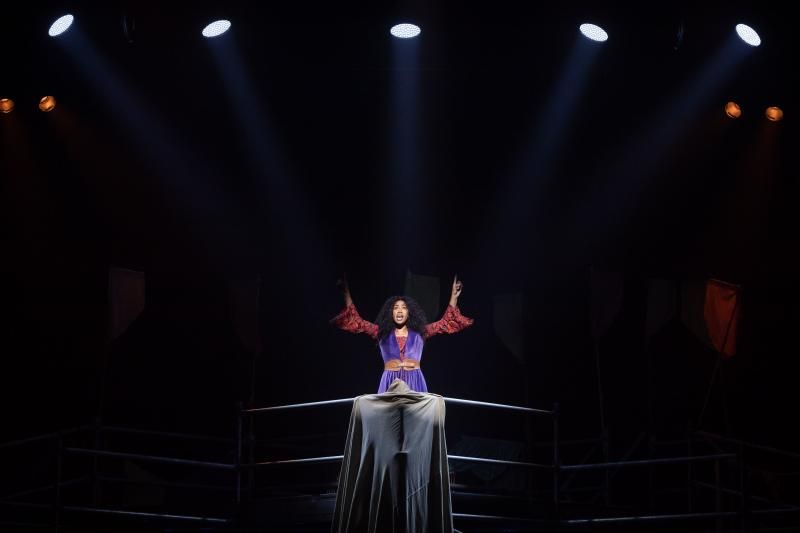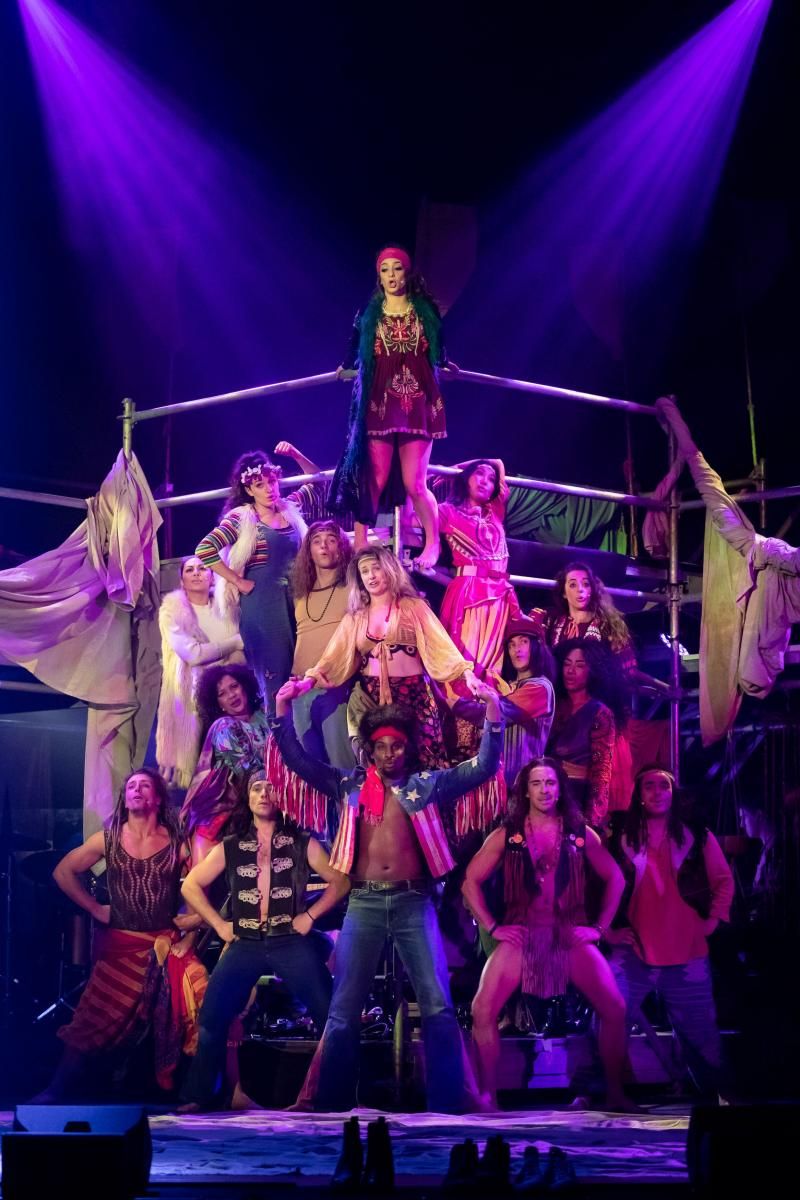Review: Guest Reviewer George Farmakidis Shares His Thoughts On HAIR

Guest Reviewer George Farmakidis shares his thoughts on HAIR at Sydney Opera House
As I watched HAIR: The American Tribal Love-Rock Musical in the Concert Hall of the Sydney Opera House, it dawned on me that it's almost impossible to take this show solely at face value - purely as a musical that is premiering a fresh interpretation of its source material - without hemming it respectfully against its 1969 Australian premiere, a long (or short) fifty years ago; this particular iteration being brought back to the country through a labour of love by David M. Hawkins, ever respectful of the iconic play.
Unlike Chicago, currently playing at the Capitol Theatre, where the viewer can be transported back to the Roaring 20's (all the while remaining safely in their seat still very much in the year 2019), there is a strange quantum/time travelling effect that a musical about anti-war, anti-establishment, pro-liberation - political, sexual, moral and otherwise, has on the audience at large.
 An interesting dichotomy unfolds from the opening number: the musical's controversial debut and the era of its original production finds itself playing against thecurrent incarnation of its staging and the socio-political backdrop of the present day. Would this be a 'product-of-its-time' revisitation, or would modern sensibilities be affected in a way that belied the sixties setting? In essence, would this be a safe, time capsule viewing, or is the play's commentary still very much relevant in today's world?
An interesting dichotomy unfolds from the opening number: the musical's controversial debut and the era of its original production finds itself playing against thecurrent incarnation of its staging and the socio-political backdrop of the present day. Would this be a 'product-of-its-time' revisitation, or would modern sensibilities be affected in a way that belied the sixties setting? In essence, would this be a safe, time capsule viewing, or is the play's commentary still very much relevant in today's world?
The opening number, Aquarius, transports the audience to the counter-cultural revolution of the sixties, with its 'make love, not war' message. The cast emerge in resplendent era-defining fashions from behind the set - a simple scaffolding structure covered in colourful swathes of fabric and flags. In a matter of the next few songs, the topics of racism, sexuality and drug taking all come up; the cast (or tribe, more accurately) being introduced to the audience both as an ensemble and as individuals, duos, trios, etc. The exuberance of the actors perfectly conveying the message of everyone and everything beingwelcomed and accepted with no pleasure denied; the only caveat being that no harm shall befall another person.
 Matthew Manahan skilfully inhabits the skin of Claude Hooper Bukowski, as the protagonist who propels the story along from a tribe of free loving souls to an ethical/moral examination of conscription, war, corruption, environmentalism, discrimination (race, sexuality and gender) and the role freedom has within a society; one that is at war with 'the other' as well as itself.
Matthew Manahan skilfully inhabits the skin of Claude Hooper Bukowski, as the protagonist who propels the story along from a tribe of free loving souls to an ethical/moral examination of conscription, war, corruption, environmentalism, discrimination (race, sexuality and gender) and the role freedom has within a society; one that is at war with 'the other' as well as itself.
Hugh Sheridan invokes the anti-establishment fervour by fully possessing the role of Berger, who weaves in and out of most of the action on stage, successfully portraying the excitement and uncertainty of a young man attempting to find his true self. The incredible Paulini, who is the show's vocal standout as Dionne, and Prinnie Stevens' Sheila, remind us all once again what powerhouses they are as they wrest all the emotional notes out of their respective performances. Hud, soulfully played by Harris M. Turner, and Jeanie, imbued with irrepressible energy by the charismatic Angelique Cassimatis, faithfully lead the tribe ensemble who work together seamlessly, invoking a kinetic, almost writhing wave of young individuals yearning for self-expressionand ultimately freedom.
 When the final number of Act I arrives, complete with the now legendary scene of full frontal nudity, it feels rather apt, reminding us that there is nothing gratuitous about the naked human form, especially in the context of the scene. I suspect the controversy helped sell tickets in years gone by, which is the prerogative of any promoter, but in today's social media saturated culture it is less titillating and more poignant social commentary.
When the final number of Act I arrives, complete with the now legendary scene of full frontal nudity, it feels rather apt, reminding us that there is nothing gratuitous about the naked human form, especially in the context of the scene. I suspect the controversy helped sell tickets in years gone by, which is the prerogative of any promoter, but in today's social media saturated culture it is less titillating and more poignant social commentary.
Once Act II begins it immediately becomes apparent that nudity was not the only controversy. A night at the theatre is abruptly turned on its head, which undoubtedly would have maddened the staid theatre establishment on its debut, fifty years ago. In short, linear narrative be damned! Songs with no rhyming couplets and withoutdiscernible endings arrive and depart just as quickly into the ether, further adding to the hallucinatory trip thatcreators James Rado and Gerome Ragni wished to take the audience on, this time in the very capable hands of director, Cameron Menzies. Allowing the LSD-tinged American history lesson to wash over you, without intellectual grasping or left-brain over analysis, is truly the best way to allow the symbolism to emerge intact from the haze.
 It is important to note that within the acid-induced trip of the second half, the thread very much remains Claude's struggle with conscription, war and the role he believes he should play/is expected of him (from both parent and friend alike) that juts hard against his stance on anti-violence. The patriot vs. conscientious objector tug of war plays itself out through the iconic songs that are known both within and without the setting of its source musical - the soundtrack still one of the most successful in the history of musical theatre.
It is important to note that within the acid-induced trip of the second half, the thread very much remains Claude's struggle with conscription, war and the role he believes he should play/is expected of him (from both parent and friend alike) that juts hard against his stance on anti-violence. The patriot vs. conscientious objector tug of war plays itself out through the iconic songs that are known both within and without the setting of its source musical - the soundtrack still one of the most successful in the history of musical theatre.
As the show reaches its joyous and choral conclusion, both history and present inevitably collide, reminding us that even though the Vietnam War may be over, and that 60's/70's fashion may now be relegated to fancy dress, the same conflicts are presently being fought onbattlefields around the world and within society at large, the family unit included. Love, acceptance, and equality - in all of its guises, are still vital callings to the individual and to the collective - to be both witness and advocate to. It is a powerful finale to what from the outset could just have been seen as a nostalgic trip back in time, but ends up showing us that perhaps no time has passed at all.
Photos: Daniel Boud
Reader Reviews
Videos

